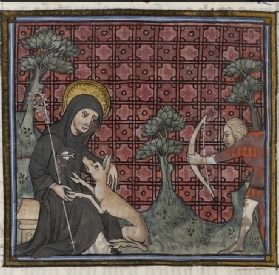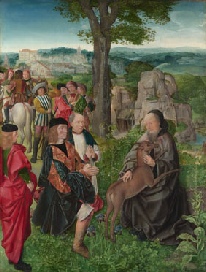










About the Saint Giles
As would be expected there are many versions and legends surrounding this Saint who was popular throughout Europe during the Middle Ages. St Giles lived from 650 to about 710 AD.
St Giles is said to have been a seventh century Athenian of noble birth and the son of King Theodore and Queen Pelagia of Athens, though doubt has been cast on the historical accuracy of this claim. Whatever his origins, he seems to have spent most of his life in the area around modern Arles and Nîmes in Southern France and some schools of thought suggest he was actually born in South Eastern France and not Athens. However all records seem to agree that he spent most of his adult life in that region of France.
According to legend he became a hermit deep in the forests of the area, with his only companion being a deer. His solitude came to an end when hunters catching meat for the Frankish King Wamba chased the deer and accidentally shot St Giles with an arrow.
By way of recompense, King Wamba built a monastery for Giles, which became known as Saint-
One persistent story is that during a mass conducted by Giles to pardon the Emperor Charlemagne's sins, an angel placed on the altar a letter detailing a sin that was so terrible that Charlemagne had never dared to confess it. The problem with the story from a historical point of view is that Charlemagne was not born until around three decades after Giles died. The best interpretation for the story is that it was a later invention, intended to harm Charlemagne's reputation. What is perhaps more significant is that those who invented the story chose to feature St Giles within it, thus making capital from a reputation that must already have been strong.
He spend many years in solitude conversing only with God. The fame of his miracles became so great that his reputation spread throughout France. He was highly esteemed by the French king, but he could not be prevailed upon to forsake his solitude. He admitted several disciples, however, to share it with him.




Alderton Parochial Church Council
St Giles Church, The Street
Alderton SN14 6NL
Administrator: Alison Withers
01666 825019
stgilesalderton@outlook.com






Saint Giles was one of the most popular saints of the middle ages, in England alone more than 160 churches were dedicated to him. One of the sections of the city of Brussels is named after him. In Germany, Giles was included among the so-
His popularity stems from the diversity of his charges, who are largely people who suffer an affliction of some kind and who would wish for saintly intercession by way of relief. This is listed as including beggars; blacksmiths; breast cancer; breast feeding; cancer patients; disabled people; epilepsy; fear of night(noctiphobics); forests; hermits; horses; lepers; mental illness; outcasts; poor peoples; rams; spur makers; sterility and of course deer.
Saint Giles remains highly venerated today. The centre of his cult is the abbey at Saint-
He is also the patron saint of Edinburgh, Elgin, Graz, Nuremberg, Osnabrück, Sankt Gilgen, Brunswick, Wollaberg, Saint-
The pilgrimage centre that once drew so many fell into disrepair some centuries after Giles’ death.

The stained glass widow of St Giles in Alderton Church